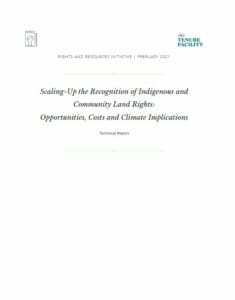Date: March 9, 2021
A growing body of evidence suggests that recognition of the collective tenure rights of Indigenous Peoples, local communities, and Afro-descendants is a powerful and cost-effective strategy for addressing the climate and biodiversity crises. In spite of this, international funding for rights recognition pales in comparison to donor mobilization around alternative solutions to these crises.
This technical report analyzes costs and opportunities for scaling-up the recognition of the collective tenure rights of Indigenous Peoples, local communities, and Afro-descendants as a viable pathway to confronting climate and biodiversity crises. The authors reviewed recent findings that demonstrate the possibility of rapidly scaling up formal recognition of collective tenure rights across 29 low- and middle-income countries in Africa, Asia, and Latin America. They then calculated different carbon-benefit scenarios to quantify the potential reduction in carbon loss resulting from formal recognition of collective tenure rights regionally and globally. The report also calculated the cost of recognizing communities’ collective tenure rights per hectare and the cost per tonne of avoided emissions of CO2 resulting from this recognition. It then compared these figures to the costs of alternative pathways to addressing the climate and biodiversity crises.
https://doi.org/10.53892/QMUD8864

